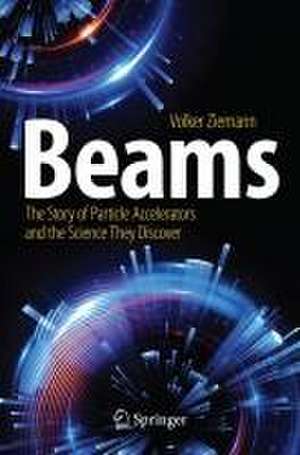Beams: The Story of Particle Accelerators and the Science They Discover: Copernicus Books
Autor Volker Ziemannen Limba Engleză Paperback – 31 mar 2024
This book describes and explains the world of particle accelerators and the physics they study. The presentation is non-technical (E=mc2 is the only equation!) and the prose accessible. By following the co-evolution of particle accelerators and particle physics, readers will learn why the accelerators are built, how they work, and what "results" they produce. The book highlights the great ideas (e.g. synchrotron) and technological advances (superconducting magnets) that boosted the potential of accelerators and led to new discoveries, eventually resulting in the standard model of particle physics. Many concepts are illustrated with figures derived from three-dimensional models; these include the
accelerators, detectors, and particles. Background information about the main protagonists, along with pointers to further reading, e.g. from "Scientific American," are provided in endnotes.
Din seria Copernicus Books
- 5%
 Preț: 160.41 lei
Preț: 160.41 lei -
 Preț: 131.12 lei
Preț: 131.12 lei -
 Preț: 161.23 lei
Preț: 161.23 lei -
 Preț: 162.68 lei
Preț: 162.68 lei - 5%
 Preț: 123.81 lei
Preț: 123.81 lei -
 Preț: 136.09 lei
Preț: 136.09 lei - 5%
 Preț: 143.19 lei
Preț: 143.19 lei -
 Preț: 172.22 lei
Preț: 172.22 lei -
 Preț: 199.48 lei
Preț: 199.48 lei - 5%
 Preț: 125.14 lei
Preț: 125.14 lei -
 Preț: 123.27 lei
Preț: 123.27 lei - 5%
 Preț: 165.50 lei
Preț: 165.50 lei - 5%
 Preț: 202.46 lei
Preț: 202.46 lei -
 Preț: 110.05 lei
Preț: 110.05 lei -
 Preț: 103.91 lei
Preț: 103.91 lei - 5%
 Preț: 103.98 lei
Preț: 103.98 lei -
 Preț: 132.16 lei
Preț: 132.16 lei
Preț: 125.51 lei
Nou
Puncte Express: 188
Preț estimativ în valută:
24.02€ • 26.10$ • 20.19£
24.02€ • 26.10$ • 20.19£
Carte disponibilă
Livrare economică 31 martie-14 aprilie
Livrare express 15-21 martie pentru 35.81 lei
Preluare comenzi: 021 569.72.76
Specificații
ISBN-13: 9783031518515
ISBN-10: 3031518519
Pagini: 198
Ilustrații: X, 198 p. 70 illus., 67 illus. in color.
Dimensiuni: 155 x 235 mm
Greutate: 0.36 kg
Ediția:2024
Editura: Springer Nature Switzerland
Colecția Springer
Seria Copernicus Books
Locul publicării:Cham, Switzerland
ISBN-10: 3031518519
Pagini: 198
Ilustrații: X, 198 p. 70 illus., 67 illus. in color.
Dimensiuni: 155 x 235 mm
Greutate: 0.36 kg
Ediția:2024
Editura: Springer Nature Switzerland
Colecția Springer
Seria Copernicus Books
Locul publicării:Cham, Switzerland
Cuprins
Notă biografică
Volker Ziemann obtained his PhD in accelerator physics from Dortmund University in 1990. After post-doctoral positions in Stanford at SLAC and in Geneva at CERN, where he worked on the design of the LHC, in 1995 he moved to Uppsala where he worked at the electron-cooler storage ring CELSIUS. In 2005 he moved to the physics department where he has since taught physics. He was responsible for several accelerator physics projects at CERN, DESY and XFEL. In 2014 he received the Thuréus prize from the Royal Society of Sciences in Uppsala. He was a member of Uppsala University’s senate, served on evaluation committees for the German ministry of research, is a member of the Scientific Council of the Helmholtz Institute in Mainz, and teaches at CERN accelerator schools. He authored three books and over 200 articles and reports.
Textul de pe ultima copertă
This book describes and explains the world of particle accelerators and the physics they study. The presentation is non-technical (E=mc2 is the only equation!) and the prose accessible. By following the co-evolution of particle accelerators and particle physics, readers will learn why the accelerators are built, how they work, and what "results" they produce. The book highlights the great ideas (e.g. synchrotron) and technological advances (superconducting magnets) that boosted the potential of accelerators and led to new discoveries, eventually resulting in the standard model of particle physics. Many concepts are illustrated with figures derived from three-dimensional models; these include the
accelerators, detectors, and particles. Background information about the main protagonists, along with pointers to further reading, e.g. from "Scientific American," are provided in endnotes.
Caracteristici
Makes particle accelerators and the physics they explore accessible to a wide audience Describes the great ideas that make new accelerators and experiments possible Contains numerous specially designed and easy-to-understand diagrams
